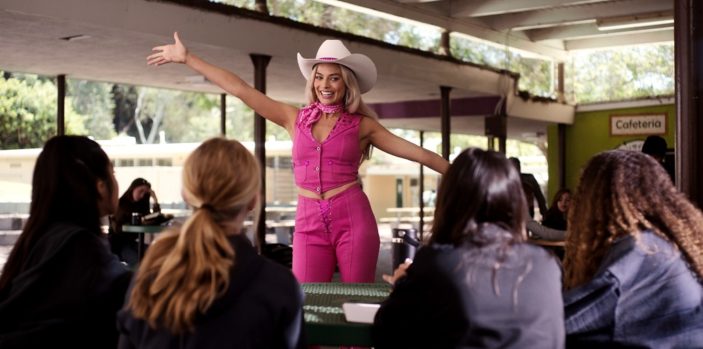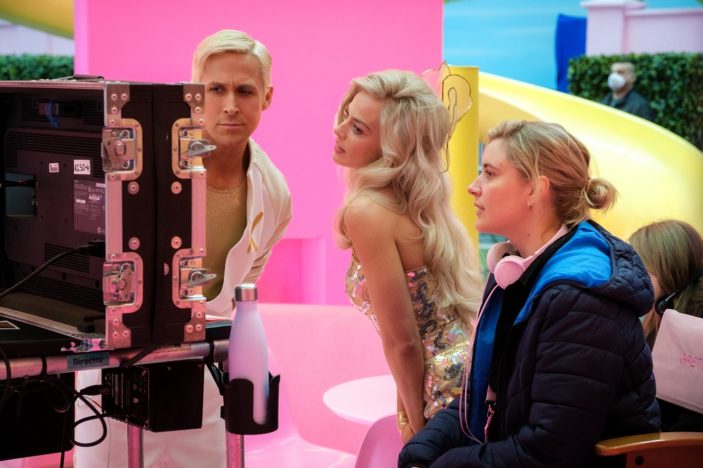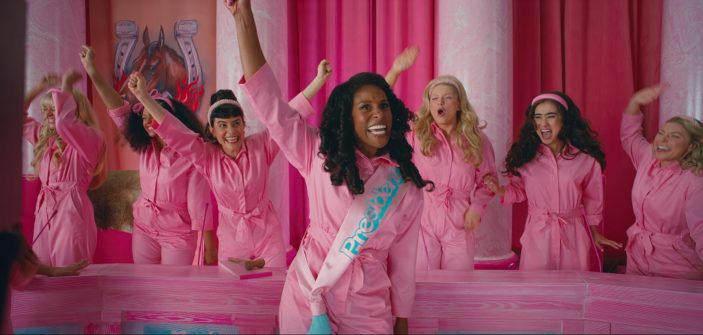
She’s everything. We’re just living in her world.
Undoubtedly one of this year’s most anticipated films – if not THE most anticipated – Barbie is a pink-splashed comedy that’s all about living in the Barbie world, where giant summer blowout parties, planned dance choreography and Ken’s beaching make it the perfect place to live. That is unless you have a full-on existential crisis!
Bringing the classic doll to life is Academy Award nominated writer and director Greta Gerwig and Academy Award nominated actress and producer Margot Robbie, and as the film gears up to take the world by (pink) storm, the duo took over Sydney for a couple of pastel-laced days to talk about their new film and the journey of getting it to the big screen.
Joined by co-stars America Ferrera and Issa Rae, our Peter Gray was invited to the Australian press conference to hear them discuss bringing such an iconic creation to life, if there were concerns pertaining to female representation, and changing the perception of what it is to be a “Barbie”.
Barbie is such a beloved IP, and it’s such a big thing to take on. You’ve created this original, smart, funny film for everyone. How are you feeling right now in this moment when the film is about to drop around the world, and is being touted as one of the most anticipated films of 2023?
Greta Gerwig: At this very moment, just being in this setting and being with all of you and the beach, and we’re in Australia and this movement and all these talented people I really am having like, “Oh, what a spectacular life this is.” (Laughs) I mean, I know it’s like overwhelming and amazing, and I just feel very grateful that Margot came to me almost four years ago and said, “Would you want to write a Barbie movie?” And I am grateful that in my postpartum haze of four years ago, I said yes. It’s just been such an extraordinary confluence of so many people coming together who are just so outrageously smart and talented… and that we got to make this wild bananas Barbie movie feels like just an extraordinary blessing.
Margot, how did this project come together in the first place? And what made you want to tell this story?
Margot Robbie: I was aware that the Barbie IP was floating around. It had kind of gotten up and running and hadn’t come to full fruition. So we’d been keeping tabs on the property, and when there seemed like there was an opening we kind of jumped at the opportunity. We sat down with the Mattel CEO (about) five years ago and kind of pitched what we, as a production company, would want to do with a Barbie movie. And I knew even at that time that I would want to do it with someone like Greta Gerwig. She was the dream writer and director for it. I didn’t know if she was gonna say yes to it, but there were very few people in my mind that I’d want to make a Barbie movie with (with) Greta being the top of the list.
But the reason we went after the property, I think, is because it seemed like a very big and exciting and scary opportunity. The (Barbie) word itself is globally recognised. And not only that, people have very strong feelings about Barbie in a lot of cases. So it felt like a really exciting place to start a film, you know, start that thing with the audience where they already feel a certain way. But, at the very least, they have associated childhood memories with it. It just seemed like we could do something special with it.

And Issa, you’re boss Barbie. President Barbie. How was it to be the president of Barbie land?
Issa Rae: I like you calling it boss Barbie. I prefer that. But it was spectacular. You know, Greta approached me in our interview-slash-meeting and told me that she envisioned a world, a Barbie world, where I was president, and I was super flattered by that. But I also questioned her tastes in political leaders (laughs). But it’s a world that is perfect and beautiful, and, you know, seeing her brilliant writing and the cast attached it was a no brainer for me. I was just honoured to play in the world.
America, your character is one of the few humans in the film – the story itself is all very much under lock-and-key – but what was it drew you to the story?
America Farrera: Well, it was Margot and Greta’s involvement that made me interested. The script was sort of irresistible (too). To be invited to take a peek into the world that these two incredibly talented and intelligent, respected women in our fields we’re going to do with Barbie? I never imagined myself in a Barbie movie, and I just opened the script and I was laughing on page one, and then I was crying ,and then I was laughing and crying… I had so many feelings and truly my first thought was, “Are they even going to let Greta make this?” I didn’t go into (this film) feeling invested in the Barbie world. I didn’t grow up playing with Barbies. I didn’t feel represented in the world of Barbie. But Greta and Noah’s (Baumbach) brilliance created a world that made it relevant to me. And it is really exciting to get to be a part of a moment that is expanding. Such an influential female iconic character in our global culture, to include more of us, and also to include people with perspectives that aren’t necessarily positive and kind toward the very long legacy in history that Barbie has.
Going off that, as America you said you didn’t grow up playing with Barbie, for the four of you was there a “Barbie Bootcamp”, so to speak? Did you have to go off to Mattel and learn the do’s and don’ts? I imagine with an IP like Barbie there’d be a few rules around that?
Greta Gerwig: Well, I grew up with a mom who didn’t love Barbie, which only made me more interested in Barbie. I got a lot of hand-me-down Barbies, so I got a lot of Barbies who looked like Kate McKinnon’s version (laughs), (where) it was like they didn’t have hair and their clothes were on backwards. So that Barbie is very close to my heart. When we signed on to write it I went to the Mattel headquarters and they opened up all the archives and took me through everything from you know, 1959 until now, and their designers and the people who work there were just really fun to talk to and really interesting. But I would say what we did was if there were rules, I think we broke all of them. That was part of the fun of it. It was like “Tell me what your sacred cows are and I will do something naughty with it.” But Margot, as a producer, was so instrumental in the whole process of just saying, “I want to make this.” I wanted to make her version of this movie, her vision, and really protect (that). But yeah, if anything, it was like an introduction to all the rules that could be broken.
America Ferrera: I remember when Greta and I first started speaking, she gave me sort of a list of movies to watch to get in the vibe and the feel and the tone. And actually, one of the movies I watched was a documentary called Tiny Shoulders, about sort of the expansion of the brand. And I learned so much watching that (and) through the making of this movie with the little bits of research that are either in the movie or that you caught researching it. It’s really phenomenal to get a sense of how long the Barbie legacy has been, and how there have been times in the legacy where she was a revolution and other times where she was way behind her times and she needed to catch up. But just the mere fact that she was the first doll a girl could play with that wasn’t a baby doll is is something that I didn’t really ever know. And so there was an appreciation right from the start of how long her legacy is and how varied her place in our culture has been

For Issa and America, so many women of colour have often not felt represented within the Barbie world. For you personally, were you trying to challenge and channel anything specific through your respective characters?
America Ferrera: Yeah, I mean, that’s definitely my experience. As I mentioned, I didn’t really have a connection to Barbie, and as a child I wasn’t conscious of exactly why. I suspect it had a lot to do with not feeling seen and represented in that world. And, you know, I remember when I finished reading the script I was so thrilled as just a woman in the world that this movie was getting made. That this version of this movie was getting made by these women, by Greta and Margot, and as a mother I was so thrilled that this movie was getting made because it’s a different world for young women and boys and non-binary people growing up in this day and age, to be seen and feel like they can look up to the things that we value in our culture. And that they’re represented in it means everything to us. As little girl America finishing that script and trying to wrap my mind around the fact that somebody had expanded the Barbie world, where there was space for somebody like me – and not because I had transformed into some unattainable expectation – but because our culture has shifted to make space for people like us, is so beyond moving and inspiring and so exciting to be a part of. It feels important. There I said it, this movie feels important to me on so many levels.
Issa Rae: I would say that, you know, my biggest concern was that no one wants to feel tokenized and who else is a part of it? And I think on a different level outside of initially just wondering “Who else was going to be represented as Barbie?” Walking onto the set all my fears were quelled, because there was just so much diversity. I say that after Insecure ended, I was very intentional about letting myself go. Like I was eating everything. I wasn’t worried about being on camera for a while. So who cares? And then I got the call for Barbie and I was like, “Oh no!” (Laughs). I’m sitting here a blob. I’m stuffing my face right now. And I was concerned just even on that level of just what Barbie looks a certain way. And I had this specific image in my mind of how Barbie was supposed to be presented in reading the script. Obviously the the script tackles so much of that and it was so self aware. And then walking onto set, Greta and Margot had no interest in one specific type of Barbie being represented. And so I was also comforted by that and walking onto set and just feeling like we’re in such a perfect world that consists of of everyone, and every time and that was that was so beautiful for me. So no concerns.

Margot, there was a time when calling someone a Barbie might’ve been an insult. She’s pretty and blonde, but she’s an “airhead”. How much did you want to flip the script on that and challenge that stereotype?
Margot Robbie: I definitely didn’t want to portray Barbie as being vapid in any way. And the thing about our how our story is constructed is that, you know, Barbie can be anything. Barbie can be president. Barbie can be a Nobel Prize winner. You see all this stuff at the beginning of the movie that sets up how incredibly intelligent Barbie is. But at the same time, she hasn’t been exposed to so many concepts that she’s going to be exposed to in the real world. So it was a fine line between playing naivety without it coming across as unintelligent, because I didn’t want her to seem ditzy. That’s just not interesting to play. It’s not interesting to watch either. And there are times in the movie where we lean into stereotypes. We literally call my Barbie “Stereotypical Barbie”, so we’re very much leaning into some stereotypes so that we can, in a way of being self aware, play up the comedy, (but) also have a deeper conversation about some sort of issue. But then there are other times where you’re like, Okay, if we play up that particular stereotype, it’s going to be boring for people for the hour and 40 minutes that they’re watching this movie. So yeah, it was an interesting challenge to find how do we portray the fact that she hasn’t been exposed to certain things that she’s going to learn along the way, but it doesn’t mean that she’s not intelligent.
Barbie is screening in Australian theatres from July 20th, 2023.
